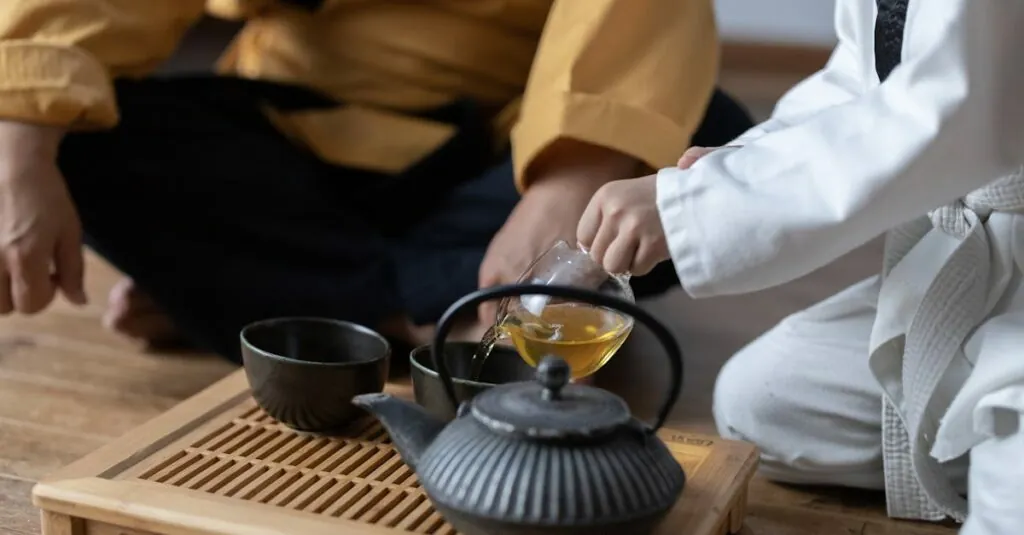Japanese family traditions are a delightful blend of history, culture, and a dash of quirkiness that keeps everyone on their toes. From the meticulous art of tea ceremonies to the heartwarming practice of family gatherings during the New Year, these customs offer a glimpse into a world where respect and harmony reign supreme.
Table of Contents
ToggleOverview of Japanese Family Traditions
Japanese family traditions reflect the country’s rich cultural heritage and deep-rooted values. Family members participate in various customs that promote unity and respect. The New Year celebration, known as Shōgatsu, serves as a significant event where families gather to share meals and partake in rituals. Eating food like mochi and soba noodles symbolizes health and longevity.
Another important tradition is the tea ceremony, or chanoyu, emphasizing respect and etiquette. Participants meticulously prepare and serve matcha, ensuring every detail is perfect. These ceremonies illustrate the aesthetics central to Japanese culture.
Respect for ancestors holds great importance in Japanese society. Families honor their forebears during festivals like Obon, where they welcome back the spirits of deceased relatives. Offering lanterns and food at altars demonstrates gratitude and remembrance.
Birthdays are also celebrated with a focus on milestones. Celebrating a child’s first birthday, known as shichi-go-san, involves dressing them in traditional clothing and visiting shrines. This ritual highlights the community’s support for a child’s growth and wellbeing.
Harmony within the family is a core value embedded in these traditions. Communication often revolves around maintaining peace and understanding, which fosters a supportive environment. Through these customs, Japanese families cultivate deep connections and shared memories. Each practice contributes to the overall fabric of familial relationships.
Key Elements of Japanese Family Life
Japanese family life centers on values such as respect and hierarchy, shaping interpersonal relationships and community interactions.
Importance of Respect and Hierarchy
Respect in Japanese families defines interactions among members. Age often determines the degree of respect, creating a structured dynamic. Children learn to honor their elders, which fosters a sense of responsibility. Family rituals often reinforce societal roles, ensuring everyone understands their place within the household. Parents guide children through lessons on etiquette and respect. Celebrations like Shōgatsu emphasize these values, as younger members bow deeply to their elders, showcasing gratitude. Collective decision-making reflects hierarchy, where discussions often prioritize elder opinions, maintaining family harmony.
Role of Elders in the Family
Elders serve as the backbone of Japanese families. Grandparents frequently share wisdom and cultural knowledge, educating younger generations about traditions. Their experiences shape family narratives, instilling pride in heritage. Elders often participate in daily activities, from storytelling to assisting with childcare. Milestone events, such as weddings and births, include the involvement of elderly family members, highlighting their respected status. Within the home, they tend to command authority, influencing decisions and fostering unity. The care for elders also represents a family’s moral obligation, as many strive to ensure their comfort and well-being in later years.
Celebrations and Rituals
Japanese family celebrations and rituals reflect cultural values and traditions. Notably, these events foster connections among family members while preserving ancestral customs.
New Year Celebrations (Shogatsu)
Shōgatsu holds immense significance in Japanese culture, marking the arrival of the new year. Families gather to celebrate by sharing traditional meals like toshikoshi soba, a symbol of longevity. Each household displays kadomatsu, bamboo and pine decorations that invite ancestral spirits for blessings. Rituals during this time include visiting shrines to pray for health and prosperity in the upcoming year. Important customs involve giving otoshidama, monetary gifts to children, fostering gratitude and happiness. Japanese families engage in activities such as playing traditional games and writing new year’s wishes, reinforcing bonds and shared aspirations.
Family Gatherings and Festivals
Family gatherings during festivals emphasize togetherness and cultural heritage. Events like Obon invite families to honor ancestors through ceremonies and offerings, showcasing deep respect for the deceased. Mid-August marks this celebration, when families return to their hometowns, illuminating graves with lanterns. The participation in local matsuri, lively festivals featuring food stalls and traditional dances, further strengthens familial connections. Celebrating shichi-go-san highlights milestone birthdays for children, illustrating community support and shared joy. Rituals practiced during such gatherings create lasting memories, reinforcing family ties and promoting cultural continuity.
Cultural Practices
Japanese family traditions encompass various cultural practices that reinforce familial bonds. Daily interactions often occur during family meals, which hold a significant place in family life.
Daily Family Meals
Meals serve as a platform for family connection. Families gather around the table to enjoy dishes like rice, miso soup, and seasonal vegetables. Appreciating the effort behind home-cooked meals fosters gratitude. Each family member contributes to meal preparation, whether through cooking or serving. These shared moments encourage conversations that strengthen relationships. Different generations engage in discussions that promote values like respect and harmony. Eating together becomes a cherished ritual, allowing families to bond and reflect on their daily experiences.
Seasonal Traditions and Customs
Seasonal customs celebrate significant events throughout the year. Events like Tanabata involve families creating beautiful decorations and writing wishes on colorful strips of paper. The cherry blossom season, or hanami, invites families to enjoy picnics beneath blooming sakura trees, deepening their sense of connection. During the Obon festival, families honor their ancestors by visiting graves and lighting lanterns to guide spirits. New Year celebrations, known as Shōgatsu, highlight traditions like preparing special dishes and engaging in shrine visits. Observing these seasonal practices promotes unity and shared cultural heritage while creating lasting memories within families.
Modern Influences on Japanese Family Traditions
Modern influences reshape Japanese family traditions. Cultural shifts occur as younger generations navigate between long-standing customs and contemporary lifestyles.
Changes Over Generations
Generational changes significantly affect familial practices. Young people increasingly blend tradition with modern values. While children continue to learn respect for their elders, they adopt contemporary customs, like celebrating Christmas or Halloween. Relationships within families evolve, with parents striving for a balance between tradition and modern parenting styles. Celebrations like shichi-go-san now incorporate Western influences, reflecting a broader cultural acceptance. Families find new ways to celebrate milestone events, integrating technology and social media for sharing experiences, yet maintaining essential rituals that honor heritage.
Impact of Urbanization
Urbanization alters family structures and dynamics. As families relocate to cities for work, traditional gatherings become less frequent. In urban settings, smaller living spaces limit opportunities for large family meals. Younger generations often prioritize convenience, leading to the rise of takeout or pre-prepared foods over home-cooked meals during celebrations. While traditional rituals still hold significance, urban life influences the way these traditions manifest. Families adapt, blending cultural practices with the fast-paced lifestyle of city living, which results in a unique blend of old and new customs.
Japanese family traditions serve as a vital link between generations, weaving together history and modernity. These customs not only celebrate significant life events but also instill values of respect and harmony within families. As they navigate the complexities of contemporary life, families continue to honor their heritage while adapting to new influences.
The blend of traditional practices with modern values highlights the resilience of these customs. Whether through cherished rituals or everyday gatherings, Japanese families maintain a strong sense of identity and connection. Ultimately, these traditions foster lasting bonds, ensuring that the spirit of family remains at the heart of Japanese culture.



